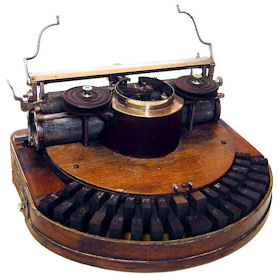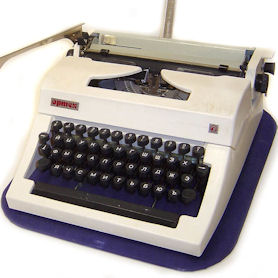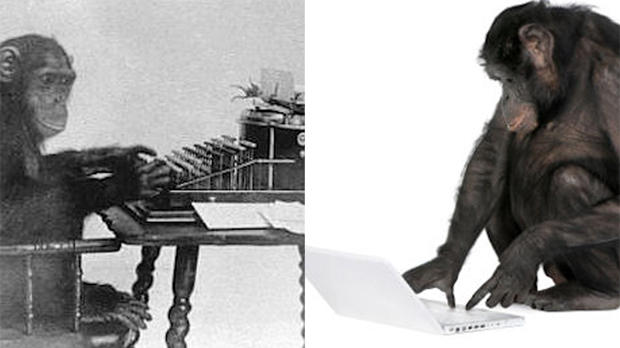The death of the typewriter?
As news emerges that the manual typewriter is now obsolete, Channel 4 News finds that new-age Luddites will continue to use the defunct machine until their last ribbons snap and the ink runs dry.

(Pictured: The 1889 Hammond 1 from Richard Polt’s personal collection)
On Tuesday, India’s Godrej and Boyce Manufacturing, the last company in the world to make the once omni-present devices, until it stopped production in 2009 announced it only has 500 left in stock.
Godrej’s production peaked at 50,000 a year in the 1990s and still was 10,000 to 12,000 until the end.
It’s something of a sad ending for a device which was first introduced to the world at the spectacular 1876 Philadelphia Centennial Exposition (the Consumer Electronics Show of yore) alongside a certain voice-transmission apparatus invented by a man named Alexander Graham Bell.
But just as the mobile phone is rapidly replacing the phone, the computer appears to finally have made the invention defunct.
But the, er, writing was on the wall when Apple computers co-founder, Steve Wozniak got his idea for the 1976 Apple 1 from a TV set and a typewriter.
“I had a TV set and a typewriter and that made me think a computer should be laid out like a typewriter with a video screen,” he famously said.
Nevertheless, just as other analogue devices made obsolete by technological advances become collectors items for collectors with an penchant for all things anachronistic, there are writers, poets and academics who swear by the typewriter, invented by Christopher Sholes, to this day.

The collector
Richard Polt, a philosophy professor at Xavier University in Cincinnati, Ohio, collects old typewriters and has amassed a staggering 200 individual items dating from 1889 to 1993 (the Ortekh, pictured). He, for one, bemoans the demise of the once ubiquitous machines.
“The end of mechanical office typewriters makes me wistful as a typewriter lover, but it was inevitable,” he told Channel 4 News.
“For the creative writer, what is lost is a personal connection with a tool that has character and history, and that might outlive you. When you depend on a computer, you also lose independence: you depend on a power supply, on hardware and software manufacturers, and more subtly, on the eyes of the public that are always looking over your shoulder – either through spyware or through the sheer ease of publishing text online. A manual typewriter is a companion that is your own and that focuses you on your own words.
“For the sheer pleasure of the act of writing, I very much enjoy a manual typewriter. It’s like riding a bike instead of driving: sometimes efficiency is not the point. A typewriter has advantages over a computer, for certain purposes. There are no distractions. All you can do is write. Since it’s harder to correct what you just wrote, you tend to be more deliberate and thoughtful when you sit down to write; and, once you really get going, you turn off your inner editor and stop second-guessing yourself. It’s an excellent way of producing a first draft, which can then be revised by computer.
Mr Polt predicts that collectors’ appetites for vintage typewriters in good condition will now soar.
“There is definitely an increase in people who want a manual typewriter of their own, to use for actual writing. Plenty of young people are tired of scatterbrained multitasking, the erosion of privacy, and other effects of digital devices. Good vintage typewriters are selling well, and the few typewriter repair shops still in existence have seen an increase in business. Informed typewriter lovers generally haven’t been buying new machines, but have been buying the great typewriters of the 1920s-1960s on eBay and similar sites. These machines were made to endure, and with a little luck and care, they will continue to work for years to come.”
Reaction on Twitter:
Channel 4 News followers have given a mixed reaction on Twitter to the news that the era of typewriter is officially over.
Sandy Lynn McCown adopts a pragmatic tone when she says: "[technology becoming obsolete] happens, one day we'll be replaced."
A seemingly frustrated Fook Fm points the limitations of the typewriter: "Typewriters were good in their day but where was the porn?"
And Bertil Rogers performs the impressive feat of concisely summarising the typewriter's supersession was inevitable whilst lamenting the grammatical shortcomings of the modern day footballer: "No need for a shorthand secretary and ribbons for abbreviation, semantic and phonetic functions. This is replaced by SMS or being a twit on twitter...or young people who can't spell [like] Wayne Rooney, methinks."
Bertil was referring Piers Morgan's recent criticism of Rooney's grammar in his tweets - although Twitter is well-known for writing in hurried, mistake-ridden shorthand.
The typewriter is immortalised in pop culture and the philosophical concept of the infinite monkey theorem, which states that a monkey punching keys at random on a typewriter keyboard for an infinite amount of time will almost surely type a given text, such as the complete works of William Shakespeare. With our viewers warning that the death of the typewriter signals a worrying new age of technological advance, should we really be handing laptops to monkeys?
You Maniacs! You blew it up!
